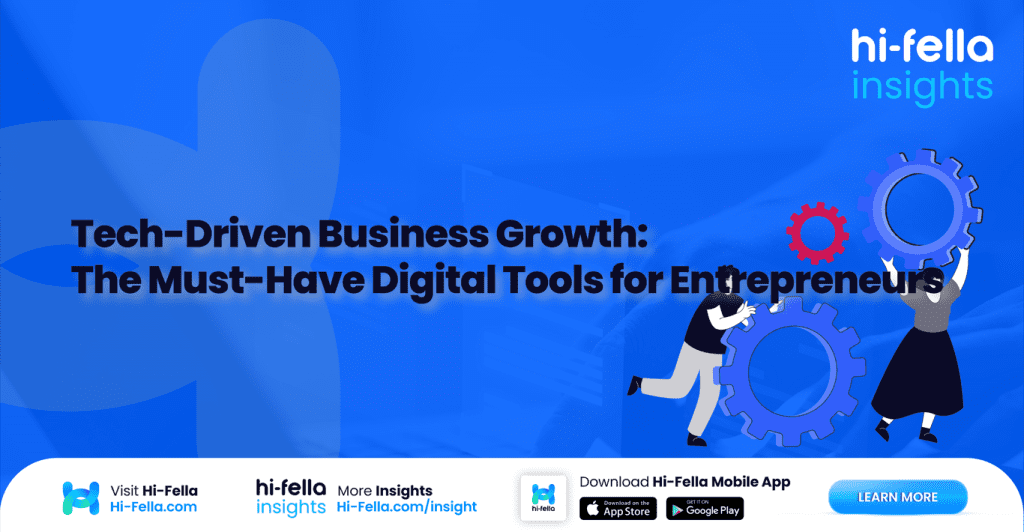Technology has become the backbone of modern business success. Entrepreneurs today rely on digital tools to streamline operations, enhance productivity, and reach global audiences. Whether you are launching a startup or scaling an existing business, the right technology can drive efficiency, cut costs, and give you a competitive edge in the market.
From automation software to AI-powered analytics, businesses now have access to a wide range of digital solutions that boost productivity, optimize workflows, and enhance customer experiences. This article explores the must-have digital tools that every entrepreneur should leverage for sustainable business growth and how platforms like Hi-Fella can connect businesses with global opportunities.
Cloud-Based Productivity Tools
The Need for Cloud Solutions
Modern businesses are no longer confined to physical offices. Cloud-based tools allow teams to work from anywhere, collaborate seamlessly, and store data securely. They eliminate the need for traditional file storage systems, making data retrieval and sharing faster and more efficient. Entrepreneurs can access important documents, communicate in real time, and manage tasks without physical constraints, making cloud technology an essential part of digital business transformation.
Top Cloud-Based Productivity Tools
- Google Workspace: A complete suite of collaboration tools, including Gmail, Google Drive, Docs, and Meet, that allows for real-time document editing and cloud storage.
- Microsoft 365: Provides cloud-based versions of Word, Excel, PowerPoint, and Teams for seamless communication and collaboration.
- Slack: A team messaging app that integrates with other business tools, making it easier for teams to communicate and track progress.
- Asana & Trello: Project management tools that help businesses track tasks, assign responsibilities, and improve workflow efficiency, ensuring that deadlines are met and teams stay organized.
How It Boosts Business Growth
By leveraging cloud-based tools, businesses increase efficiency, reduce operational costs, and enable remote working—making global expansion easier and more seamless. Cloud solutions enhance business agility, making it easier for companies to adapt to changing market conditions.
AI & Automation Tools for Business Efficiency
The Rise of Automation
Automation is revolutionizing how businesses operate by eliminating repetitive manual tasks. This allows entrepreneurs to focus on strategy and customer engagement rather than administrative work. Automation ensures consistency, minimizes errors, and significantly reduces operational bottlenecks, resulting in increased productivity.
Essential AI & Automation Tools
- Zapier: Connects different apps and automates workflows, saving time on manual tasks such as data entry and notifications.
- HubSpot: A CRM that automates marketing, sales, and customer service, allowing businesses to scale without expanding overhead costs.
- Chatbots (Drift & Intercom): AI-powered chatbots that engage customers, answer FAQs, and generate leads 24/7, providing better customer service while reducing reliance on human agents.
- Hootsuite & Buffer: Social media automation tools that help businesses schedule and optimize posts across multiple platforms, ensuring consistent audience engagement.
Business Benefits
Automation allows businesses to increase efficiency, minimize errors, and improve customer engagement, leading to higher sales and lower operational costs. Businesses that embrace AI and automation can accelerate decision-making and improve data-driven strategies.
Digital Marketing & SEO Tools
Why Digital Marketing is Crucial
With businesses moving online, digital marketing is key to reaching a global audience. Entrepreneurs need data-driven tools to analyze performance, optimize campaigns, and drive customer engagement. Digital marketing ensures businesses remain visible in a crowded online marketplace.
Top Digital Marketing Tools
- Google Analytics: Tracks website traffic and customer behavior, offering insights into what marketing strategies work best.
- SEMrush & Ahrefs: SEO tools that help improve website rankings, optimize keywords, and analyze competitor strategies.
- Canva: A user-friendly design tool for creating engaging marketing materials, including social media graphics and advertisements.
- Mailchimp: Email marketing automation for customer outreach and retention, allowing businesses to run targeted email campaigns with measurable results.
Growth Potential
By utilizing these tools, businesses can increase brand visibility, attract more customers, and scale revenue with targeted digital strategies. Entrepreneurs who leverage SEO and digital marketing effectively outperform competitors and improve their online presence.
E-Commerce & Payment Solutions
The Rise of Online Commerce
With more consumers shopping online, businesses must leverage e-commerce and digital payment solutions to streamline transactions and enhance customer experience. Online shopping is now the preferred method for many consumers, making e-commerce a critical business expansion strategy.
Essential E-Commerce Tools
- Shopify & WooCommerce: Platforms that allow businesses to build and manage online stores efficiently, complete with inventory tracking and payment processing.
- Stripe & PayPal: Secure online payment gateways that support international transactions, ensuring businesses can accept payments from global customers.
- BigCommerce: A scalable e-commerce solution with multi-channel integration, enabling businesses to sell across multiple platforms.
- Square: An all-in-one payment and point-of-sale system that simplifies both in-store and online transactions.
Business Advantages
A strong e-commerce presence expands market reach, simplifies transactions, and enables businesses to sell globally without geographical limitations. Businesses that optimize their e-commerce strategies increase revenue and improve customer retention.
Cybersecurity & Data Protection Tools
The Importance of Data Security
Cyber threats are on the rise, and businesses must protect sensitive customer and company data from potential breaches. Data protection is no longer optional—it is essential for maintaining trust and compliance with international regulations.
Essential Cybersecurity Tools
- Norton & McAfee: Antivirus solutions that protect against malware, ransomware, and cyber threats.
- LastPass & 1Password: Secure password management tools that prevent unauthorized access to business accounts.
- Cloudflare: Enhances website security and protects against cyberattacks, ensuring uninterrupted business operations.
- VPN Services (NordVPN, ExpressVPN): Encrypts business data and ensures secure communication, especially for remote teams.
Protecting Business Growth
Implementing cybersecurity measures safeguards business assets, ensures compliance, and builds customer trust in online transactions. Businesses that prioritize cybersecurity reduce financial losses and protect their reputations.
Virtual Networking & Business Expansion Platforms
The Shift to Digital Networking
Gone are the days of physical networking events being the only way to make business connections. Virtual networking platforms and online exhibitions now enable entrepreneurs to connect with global buyers and suppliers with ease, making business growth more accessible.
How Platforms Like Hi-Fella Help Businesses Grow
- Global Market Access: Entrepreneurs can showcase their products/services to a worldwide audience without travel expenses.
- Real-Time Translation: AI-powered translation removes language barriers in business negotiations, facilitating seamless international trade.
- 24/7 Availability: Unlike traditional trade shows, online exhibitions on Hi-Fella run continuously, providing ongoing networking opportunities.
- Cost-Effective Growth: Digital networking eliminates travel and logistical costs, making expansion affordable for small and mid-sized businesses.
The Future of Tech-Driven Business Growth
Entrepreneurs must stay ahead by embracing emerging technologies like AI-powered decision-making, blockchain security, and augmented reality for e-commerce. The 5G revolution will further enhance cloud computing and remote business operations, making tech-driven growth a necessity.
Grow Your Business with the Right Digital Tools
Leveraging technology is no longer optional—it’s essential for entrepreneurs who want to scale their businesses effectively. From cloud productivity tools and AI-driven automation to digital marketing and cybersecurity, the right tech solutions will drive efficiency, global reach, and revenue growth.
For businesses looking to expand internationally, Hi-Fella offers a powerful digital platform to connect with global buyers, suppliers, and business partners. With real-time AI translation, virtual exhibitions, and 24/7 networking opportunities, Hi-Fella helps businesses overcome barriers and succeed in global trade.
Take your business to the next level. Join Hi-Fella today and unlock global opportunities!








